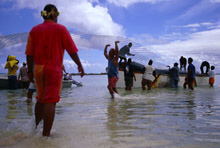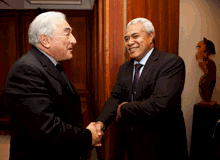
Typical street scene in Santa Ana, El Salvador. (Photo: iStock)
IMF Survey: Tuvalu Becomes IMF's 187th Member
June 24, 2010
Tuvalu joined the IMF on June 24, becoming the institution’s 187th member.

Workers unload boats on Nui Island, Tuvalu, where government has identified limited resources as economic constraint (photo: Newscom)
NEW IMF MEMBER
Tuvalu’s Minister for Finance and Economic Planning, Lotoala Metia, signed the IMF’s Articles of Agreement at IMF headquarters in Washington, D.C. Afelee Pita, the country’s Ambassador to the United Nations also attended the signing ceremony.
A Pacific island nation consisting of nine low-lying coral atolls and with a population of about 12,000, Tuvalu becomes the IMF’s smallest member. The next smallest, Palau, has a population of about 20,000.
In welcoming Tuvalu, IMF Managing Director Dominique Strauss-Kahn said that with its size and remoteness, the country “faces a unique set of economic challenges. I am confident that Fund membership will help Tuvalu strengthen its economic footing.”
Even with media attention and policy debate today centering on developments in some of the world’s largest economies, the IMF remains focused on all its members. “Tuvalu’s membership is a strong reminder of the importance of multilateralism and international cooperation in today’s dynamic global economy,” Strauss-Kahn said. The IMF, with its near-universal membership of 187 countries, facilitates this cooperation.

IMF Managing Director Dominique Strauss-Kahn ( l )
greets Tuvalu Finance Minister
Lotoala Metia at IMF headquarters
in Washington D.C.
(IMF photo)
Tuvalu’s initial quota in the IMF is 1.8 million Special Drawing Rights (about $2.7 million). This will bring the total of members’ quotas in the IMF to SDR 217.43 billion (about $321.2 billion).
Each member country is assigned a quota, based broadly on its relative economic size in the world economy. A member’s quota determines its financial contribution to the IMF and its voting power, and also has a bearing on its access to IMF financing.
In joining the IMF, Tuvalu will benefit from other services, including macroeconomic policy advice and technical assistance. Tuvalu already receives technical assistance from the IMF’s Pacific Financial Technical Assistance Center, based in Fiji since 1993, which provides technical advice and capacity building to 15 Pacific island countries.
A Washington D.C.-based team from the IMF is scheduled to visit Tuvalu later this year to review economic developments and exchange views with the government on policies to help tackle the country’s unique economic challenges in the period ahead. The government and other development partners have identified a range of socioeconomic challenges that the country faces, many of which relate to its small size, geography, limited resources, and reliance on donor resources.
The establishment of a new Resident Representative office, covering Pacific islands and based in Fiji, in September will also help provide policy advice and continue this dialogue between visits of Washington-based staff.


